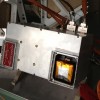ELFIN-L
Charged particles detector ELFIN-L

 ELFIN-L (Electron Loss and Fields Investigator for Lomonosov) instrument is a joint project of The Institute of Geophysics and Planetary Physics at the University of California Los Angeles (IGPP/UCLA) and Skobeltsyn Institute of Nuclear Physics of Lomonosov Moscow State University. It consist of a Flux Gate Magnetometer (FGM), an Energetic Particle Detector for Electrons (EPDE), and an Energetic Proton Detector for Ions (EPDI).
ELFIN-L (Electron Loss and Fields Investigator for Lomonosov) instrument is a joint project of The Institute of Geophysics and Planetary Physics at the University of California Los Angeles (IGPP/UCLA) and Skobeltsyn Institute of Nuclear Physics of Lomonosov Moscow State University. It consist of a Flux Gate Magnetometer (FGM), an Energetic Particle Detector for Electrons (EPDE), and an Energetic Proton Detector for Ions (EPDI).
What’s the idea of the measurement method?
The main scientific objective of the MSU-UCLA collaboration will be to understand the dominant mechanisms of the loss of energetic electrons and ions. Energetic particles create a hazardous environment for satellites and humans in space and cause a number of satellite failures. Lomonosov, planned to launch in late 2011, is well-timed with respect to NASA’s upcoming Radiation Belt Storms Probe (RBSP) mission. The two RBSP as well as the three Time History of Events and Macro-scale Interactions During Substorms (THEMIS) spacecraft already on orbit will measure trapped radiation belt particles near the equator, which in conjunctions with Lomonosov will help understand the physical processes responsible for the dynamical evolution of the near-Earth radiation environment.
The proposed measurements will also be used to quantify losses for global predictive models of the near-Earth radiation environment. Knowledge of particle precipitation rates to the atmosphere will help us understand X-ray bursts frequently observed by balloon-borne instruments, which are thought to be associated with relativistic electron precipitation. Similar loss processes may occur on the outer planets, on the Sun, and in other corners of the universe.
Parameters of the device and measured parameters:
- Energy range: 30 keV – 4,1 MeV in 16 chanels.
- FOV: 37 deg.
- Resolution of the magnetometer: 5 pTl.
- Sensitivity on 1 Ghz: 100 pTl.
 Lomonosov
Lomonosov